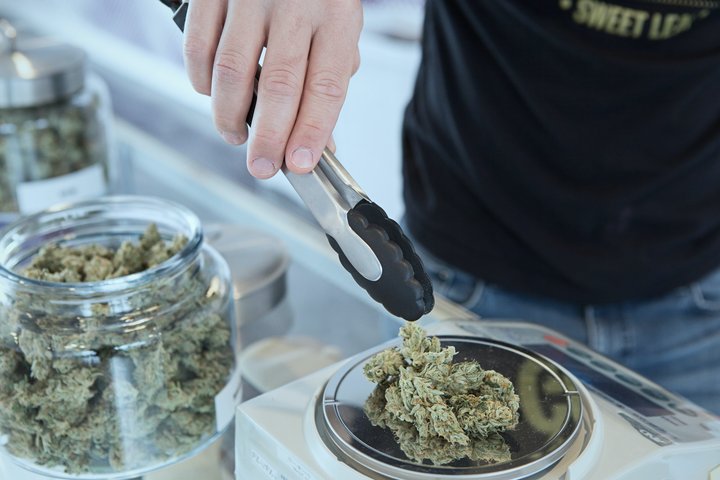###
A new bill introduced into the state legislature this week would give a leg up to small-scale cannabis farmers looking to sell their product at statewide cannabis events.
AB 2691, introduced by North Coast Assemblymember Jim Wood (D-Santa Rosa), would authorize the Department of Cannabis Control to issue temporary event retail licenses that would open the door for cannabis cultivators to sell their product directly to consumers at cannabis events like the Emerald Cup. As it stands, small-scale cultivators can participate in such events, but they cannot sell directly to the buyer.
Ross Gordon, policy director at the Humboldt County Growers Alliance (HCGA) and policy chair at the Origins Council, said the bill would give small producers “who don’t have access to sales teams and large advertising” the ability to connect directly with consumers, an essential component in building “a real market for craft cannabis.”
“The human element is a large part of what allows people to choose cannabis based on quality, values and sustainable cultivation practices, rather than flashy packaging or billboard advertising,” Gordon wrote in an email to the Outpost. “… Commodity cannabis can be produced anywhere – what differentiates us is our quality, craft, history and culture.”
Having the opportunity to connect directly with consumers will give growers the chance to share their stories and put a face to the name.
“This bill could patch up a really needed missing piece to the puzzle for us as cultivators of high-end cannabis,” Drew Barber, owner-operator of East Mill Creek Farms and co-founder of Uplift Co-op, told the Outpost. “The ability to connect with our consumers in this day and age seems like one of the major assets that could and should come along with regulation, right? The consumer should know who is growing their weed. We feel like our stories say a lot about both the quality of the product as well as the types of farming that we do.”
The fact that cultivators can’t sell directly to consumers is “absurd,” he added.
“We go through all this effort right now to make it to Santa Rosa or to San Francisco or to Los Angeles and the consumers talk with us and they get excited about our products, but when they say I’d love to buy it’s like, ‘Oh yeah, go wait in that line over there so you can purchase my weed,’” he said. “The point of sale is this important contract and when it can happen between the farmer and the consumer, it’s a different kind of bond that you don’t get when it goes through this circuitous route.”
Gordon noted that AB 2691 brings cannabis farmers one step closer to being treated like other farmers.
“For us, this bill is a major step forward in recognizing that cannabis farmers are farmers, and we need access to the same types of sales opportunities that allow other small farmers to sustain a livelihood,” he said. “Every step towards normalization, whether it’s the conversation around cultivation taxes or farmer’s markets, brings us closer to a point where cannabis is treated at parity with other agriculture.”
More information on the bill can be found here.
Here’s the press release from Wood’s office:
SACRAMENTO–Assemblymember Jim Wood (D-Santa Rosa) has introduced AB 2691, legislation authorizing the Department of Cannabis Control to issue temporary cultivator event retail licenses that would allow small-scale growers to sell their cannabis products at cannabis events in the state.
“This license will allow so many growers who cultivate cannabis on one acre or less to really showcase their products at these special cannabis events,” said Wood. “The opportunity to share their unique strains directly with consumers and allow them to reach markets previously unattainable.”
Current law allows small-scale growers to participate in cannabis events, such as the Emerald Cup, but does not allow them to sell their product limiting potential buyers’ ability to determine a product’s qualities.
“Assemblymember Wood’s bill is a lifeline for thousands of small family cannabis farms across California struggling to bring their products to market and achieve profitability,” said Genine Coleman, Executive Director of Origins Council. “This legislation will also advance destination tourism for heritage cannabis producing regions and expand consumer access to regulated craft cannabis products.”
This legislation would specify that the temporary cultivator event retail license would be valid only for the specific cannabis event for which it was issued, and would limit the number of temporary cultivator event retail licenses issued to each licensee to 12 per calendar year.“As a small farmer of both cannabis and vegetables I understand the importance of bringing products directly to customers as a small producer,” said Blaire AuClair, a small cannabis and produce farmer at Radicle Herbs and Folk Life Farm in Mendocino County. “It is imperative that small cannabis producers be able to get our products directly into consumers’ hands, to educate them about our products, to share our story and to learn about the needs of consumers. The survival of our small cannabis farms relies on the passage of this legislation.”
“The Emerald Triangle is located in the district I represent and we need to do what we can to ensure that licensed cultivators, especially small-scale growers that are competing with larger cultivators, have an opportunity to fully participate in marketing their products,” said Wood.

CLICK TO MANAGE